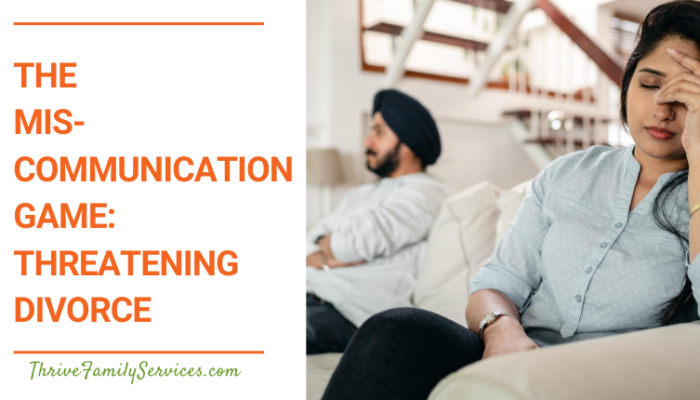Many couples come into our office struggling with communication. If you are like them, you might wonder “How do I say what I need or share how I feel without starting a fight?”
Your Delivery Counts – a Lot!
Most of us have good intentions when we approach our partner with a need or a feeling. We want to show them we are hurting so it gets better, we want to say what we need to pull them closer.
We definitely DO NOT want to push them away, have them shut, triggering their defensiveness or have them blame us in some way.
Do you know how your partner feels?
One thing we know as couples counselors is how often people don’t know how their partner really feels.
And that’s a problem, because your role as a partner is just as important as the role of parent to a child.
Great couple relationships require being able to understand your partner’s needs and recognizing signs when they are unhappy.
Imagine that, as a parent, you are unable to tell if your baby is hungry, tired, needs a diaper change, or feels scared/overwhelmed/sad, etc. How difficult would it be to soothe your baby? As you can imagine, this would cause significant difficulties and would be frustrating for both caretaker and child.
This is what happens in many adult love relationships.
How we don’t hear each other’s needs
Partners often miss what the other is really needing, asking or wanting. Why is that?
There are two common reasons you might be miscommunicating:
- You either don’t know or don’t say how you are feeling
- How you tell your partner pushes them away instead of bringing them closer
You don’t know how you feel and/or you don’t say it out loud
I always joke with my clients that even though I’m a therapist, sometimes it can take me an awfully long time to figure out my feelings. This is because we rarely feel one feeling at a time, and it’s hard to see when you are in the trees!
In couples counseling, we help you slow down, tune into your feelings, and support you to share them in a way your partner can hear.
How you say what you need or feel pushes them away
How do I say what I need?
Imagine for a moment you are in your partner’s shoes. Perhaps all you see is yelling, criticizing, or shutting down. This likely automatically triggers your attachment “alarm bells,” signaling that something is wrong. Then, you react negatively in response.
This is the negative cycle couples get caught in that causes pain, hurt, and disconnection.
In relationships, the tendency is to become preoccupied with your own needs and perspective. You perceive (often incorrectly) what your partner feels, and what is driving their behavior.
You then responding defensively to our partner’s requests or dissatisfactions, making it impossible to really understand them and have a close relationship.
Your attachment style drives your responses (but it’s not written in stone!)
If you have an anxious attachment style, you will tend to cope with threats to the relationship with various protesting behaviors. Your intention may be to try to feel closer or more secure with your partner.
But often, your protesting behaviors end up pushing your partner further away.
If you have an avoidant style, you will do the opposite. You will steer clear of your upset partner, try to avoid conflict in the first place, and “tune out” your own attachment desires. Though your ultimate goal may be to reduce conflict with your partner, your avoidant behaviors end up sending your partner into anxiety about your feelings for them.
This actually increases conflict!
Why learning about your attachment style can get you out of conflict cycles
In our Greenwood Village couples therapy practice, we aim to help you:
- Understand and recognize your own attachment needs and fears
- Figure out the quiet, underneath emotions
- Recognize your anxious or avoidant behaviors that play out in the cycle
- Learn to reach out to your partner and build a secure attachment
“How do I say what I need without an argument starting?”
Is there something wrong with us that I can’t say what I need without us fighting?
In short – no! We want you to know how normal and common this is in couples! It is NOT an unfixable problem!
We know that these behaviors are learned from an early age and were designed to protect you. At the same time, attachment styles can be changed! We will help you both learn how insecure attachment responses are causing damage to your relationship and bond, and how to respond instead to bring closeness.
“It can be hugely relieving to know that your ongoing struggle as a couple is not because either of you is crazy, but rather because you are trapped in a cycle that continues to exacerbate one another’s insecurities, pain and fears.” Levine and Heller, Attached
Understanding that your continual arguments have a hidden subtext to them can change your perception of your relationship and allow for more compassion, patience, understanding, intimacy and love.
Journey toward repair and healing
With the help of a therapist, you can slow down the process and really explore what happens in your negative cycle piece by piece.
Levine and Heller (2010) in the book Attached give these
Steps to understanding your own reactions and how that contributes to the negative cycle. Take a few minutes and see if you can figure out these four parts of your communication:
- What is your view of the relationship? (Perception)
- What triggers the activation of the attachment system, perceived as a threat (Triggers)
- What is your behavior in response – is it protesting, anxious, deactivation, withdrawal, or avoidant behavior? (Behavior)
- The costs and impact these behaviors have on the relationship and how they get in the way of true happiness (Impact)
An Imaginary Couple
For example, let’s say Joe has a very demanding job that requires him to travel frequently. Samantha and Joe just had their first child, so while Samantha has previously been understanding to Joe’s work demands, she has found herself less patient. Now, every time Joe has to travel, they get in a huge argument.
Samantha’s summary may look like this:
-
View of relationship (perceptions):
Everything was going fine. I didn’t like that Joe traveled frequently, but I accepted that it was part of his job. We would never argue about it. But recently something has shifted and I hate when he travels.
-
Trigger:
Every time he says he has a work trip scheduled.
-
Categorizing and understanding this behavior with an attachment lens:
I get really angry and start yelling. (This is called protesting behavior in Attachment theory). I believe this anxiety actually comes from being left alone with our new baby, which is overwhelming.
It’s not his fault, but I get angry at him, rather than share what it’s like and how hard it is to be left home alone with a new baby. I have no clue how to say what I need without coming off as really angry.
-
Costs of this behavior:
He gets defensive that it is not his fault he has to travel and blames me for making a big deal out of it, when I used to be accepting. He feels I’m being unfair – after all, he’s providing for our family.
We both get angry, and end up feeling worse. I don’t feel close to him and hold onto resentment the entire time he is away.
The Negative Communication Cycle is the Enemy
By really understanding, exploring and acknowledging these parts for yourself and your partner- the cycle then becomes the mutual enemy in your relationship, rather than your partner.
You can then team up to stop it in the tracks and identify new ways to communicate and manage triggers as they come up.
Effective communication is based on the understanding that both you and your partner have specific needs in your relationship, many of which are determined by your attachment style.
The key is the ability to communicate your needs in a way that does not blame your partner and does not trigger the cycle.
When your need for intimacy is met and reciprocated by your partner, satisfaction increases. When you build a secure relationship, it is a win-win situation:
If you feel anxious in the relationship, you will get the closeness you crave, if you are an avoidant partner, you’ll enjoy much more of the independence you need.
Take Control Over Your Argument Cycles
Call us at Thrive Couple and Family Counseling Services, 303-513-8975, to speak to a couples counselor about how we can help you get out of the negative cycle.
Or, schedule online now to overcome the argument cycles in your relationship:
We would love to help you explore, understand and find new ways to communicate your attachment needs (what is really bothering you) clearly without getting stuck in attacks, withdrawal or defensiveness.
For more information, refer to: Attached by Amir Levine and Rachel S.F. Heller (2010)




